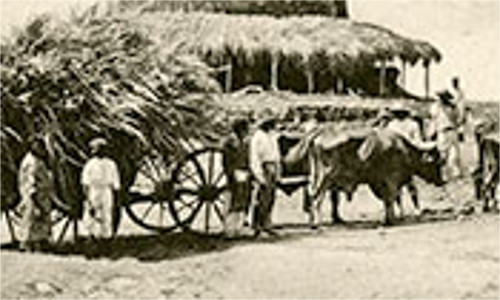
The Masters and Servants Act was passed in the Assembly on the 19 April 1849 and in the Council on the 10 May 1849.
The aim of the act was to secure continuous labour which was deemed advantageous to both employer and labourer.
The definition of labourer was very wide and included tradesmen, porters, sailors and domestics. If such a person was absent from work or damaged property of his/her employer, he/she was to be brought before two Justices of the Peas and if found guilty could be fined up to 50 shillings or condemned to jail for up to one month, with or without hard labour. Wages were forfeited to the employer.
If an employer abused a labourer or did not provide the necessary articles stipulated by contract, he could be fined up to £5 and costs.
Contracts whether written or verbal were to be effective for one calendar year.
Employers who terminated a contact had to pay a sum of one month wages or as determined by the Justices of the Peace.
Regulations were to be made about the employment of immigrants and consideration be given to the appointment of Superintendent of Immigrants to ensure that these regulations were observed.
Labourers who absent themselves without permission shall be summoned to appear before the Justices. If such persons do not appear then a warrant for their apprehension.
Persons harbouring or employing people under contract to somebody else could be fined or imprisoned.
The following are examples of cases of breach of contract as reported in the press. (A comprehensive listing of cases is impossible as very few newspapers have survived.)
St. Christopher Advertiser Aug 6, 1861
Sandy Point
Richard Lewis, Anthony Harris and Zachariah Warner were convicted of breach of contract as agricultural labourers. Defendants were employed to weed canes at Cranstouns Estate. They worked on Monday but on Tuesday they left their work saying they had too much to do. Fined 5 shillings and 1 shilling cost each or 14 days imprisonment with hard labour
St. Christopher Advertiser Oct 1, 1861
Sandy point 25th Sept
Before the police magistrate and J T Waith esquire
Marcus John was charged by Mr. D McLachlan with breach of his contract as a labourer on Fahie's estate . It appeared that defendant cultivated a piece of provision ground on the estate on condition that he should labour on the estate, he had absented himself from his labour for several weeks, in various excuses, but could nevertheless find plenty of time to work his provision ground: on the 18 Sept he turned out to work and was ordered to go and weed canes, he refused to do so and left the estate. This was the breach of contract complained of. Fined 49 shillings and 1 shilling costs or 1 calendar months imprisonment with hard labour and contract terminated.
St. Christopher Advertiser. 5 November 1861
Police intelligence
Cayon 25 Oct 1861
Before .Charles Cox and C A Smith esqrs
Catherine Isaac charged by Dorothy Daniels for nonpayment of 6 shillings 3 pence wages. Was ordered to pay the amount and costs.
St. Christopher Advertiser 12 Nov 1861
Police intelligence
Sandy Point 30 Oct 1861
William Berridge was charged by Mr. W B Amory with refusing to work he being a contract labourer. Defendant said that he did refuse to work on Saturday. Committed to gaol for one month with hard labour.
Sandy point 6 Nov 1861
George Stevens was convicted of a breach of contract as a labourer with S R Crossley on the 17 Sept and committed to goal for one month with hard labour.
St. Christopher Advertiser 5 Nov 1861
Police intelligence
Cayon 18 October 1861
Before the police magistrate and C A Smith Esq
Bramandat (a coolie) was charged by Mr Dolomon Shelford with breach of his contract as a labourer. It appeared from the evidence that the defendant refused to do the work ordered had not worked for a week. Defendant said that he would not do the work ordered (weed canes) but would do lighter work. He was committed to goal theer to be kept to hard labour for 30 days.
St. Christopher Advertiser 12 Nov 1861
Police intelligence
Old Road 29 October 1861
Before the police magistrate and R M Willsen esqr
Dheajan and Shampod (coolies) were charged by S H Richrdson Esq with breach of their contract as labourers by refusing to wor. They were fined 5 shillings each. The fines were paid
St. Christopher Advertiser August 28, 1866
Court of appeal
... Some persons were taken before the magistrate for a breach of contract. The case was heard and each person ordered to pay a fine. All seemed satisfied except one who said he would appeal. He accordingly did so and the Court of Appeal decided no contract was proved before the magistrate.
The respondent said that there was a contract between the father of the appellant and himself.
The Court was of the opinion that it was not legal and read the law concerning contracts. Decision of the magistrate reversed.




